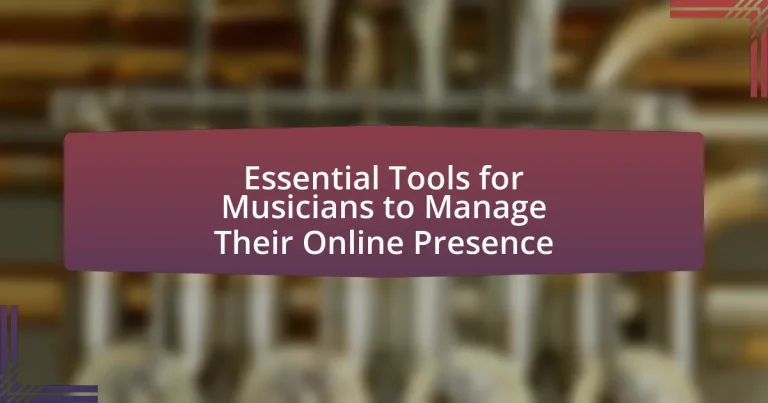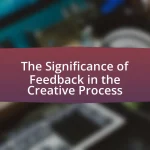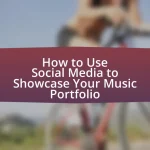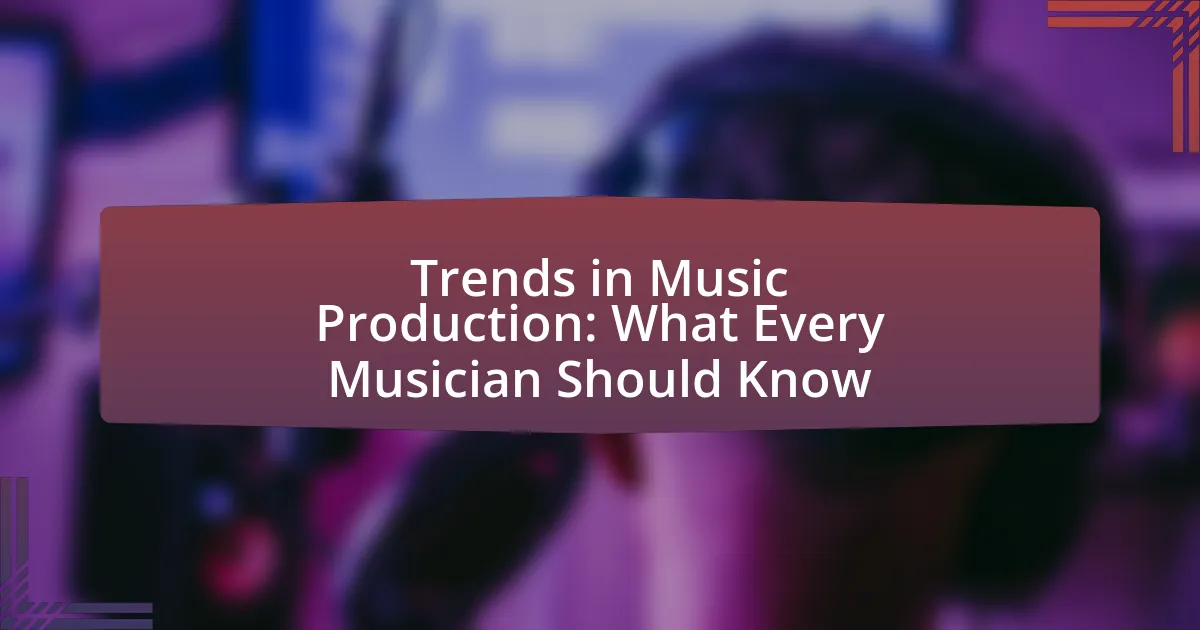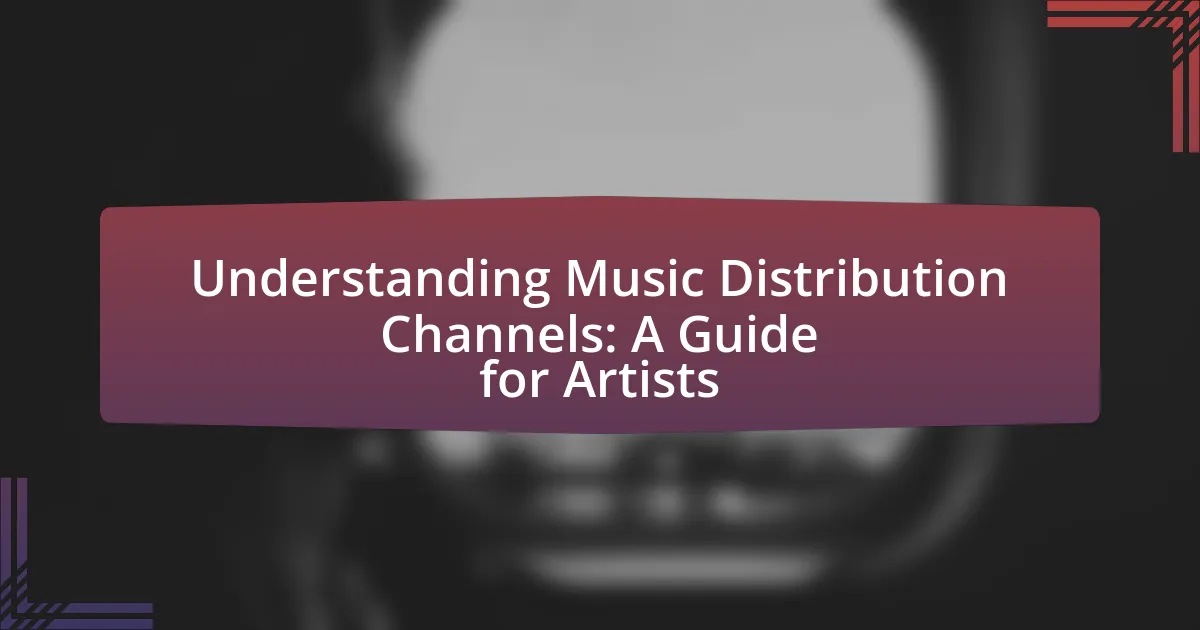The article focuses on essential tools for musicians to effectively manage their online presence, highlighting the importance of social media platforms, website builders, email marketing services, and music distribution services. It discusses how these tools facilitate audience engagement, enhance communication, and increase visibility, ultimately impacting a musician’s career opportunities. Key features of these tools, strategies for optimizing online presence, and best practices for maintaining engagement are also examined, along with the challenges musicians face in the digital landscape and practical tips for overcoming them.
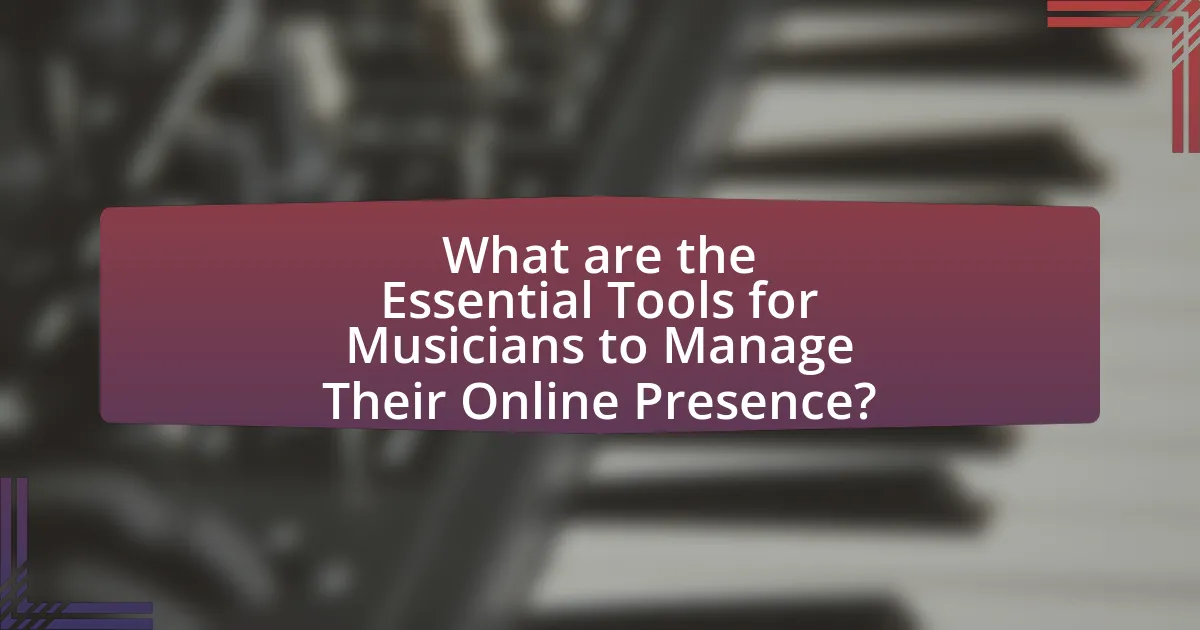
What are the Essential Tools for Musicians to Manage Their Online Presence?
The essential tools for musicians to manage their online presence include social media platforms, website builders, email marketing services, and music distribution services. Social media platforms like Instagram, Facebook, and Twitter allow musicians to engage with fans and promote their work effectively. Website builders such as Wix or Squarespace enable musicians to create a professional online portfolio showcasing their music, biography, and upcoming events. Email marketing services like Mailchimp help musicians maintain direct communication with their audience, providing updates and exclusive content. Music distribution services such as DistroKid or TuneCore facilitate the release of music on streaming platforms, ensuring wider reach and accessibility. These tools collectively enhance a musician’s visibility and engagement in the digital landscape.
How do these tools help musicians connect with their audience?
These tools help musicians connect with their audience by facilitating direct communication and engagement through social media platforms, streaming services, and email marketing. For instance, social media allows musicians to share updates, interact with fans, and receive immediate feedback, fostering a sense of community. Streaming services enable artists to reach a global audience, while email marketing provides a personalized way to inform fans about new releases and events. According to a 2021 survey by the Music Industry Research Association, 70% of musicians reported that social media engagement significantly increased their fan base, demonstrating the effectiveness of these tools in enhancing audience connection.
What specific features do these tools offer for audience engagement?
Audience engagement tools for musicians typically offer features such as social media integration, real-time analytics, customizable content, and interactive elements like polls and live chats. Social media integration allows musicians to connect with fans across platforms, enhancing visibility and interaction. Real-time analytics provide insights into audience behavior and preferences, enabling targeted content strategies. Customizable content features allow musicians to tailor their messaging and branding to resonate with their audience. Interactive elements, such as polls and live chats, foster direct communication and engagement, making fans feel more involved in the artist’s journey. These features collectively enhance the musician’s ability to build and maintain a loyal fanbase.
How do these tools enhance communication between musicians and fans?
These tools enhance communication between musicians and fans by providing direct and interactive platforms for engagement. Social media platforms, for example, allow musicians to share updates, respond to fan inquiries, and create a sense of community through comments and shares. According to a study by the Pew Research Center, 72% of adults use social media, making it a vital channel for musicians to reach and interact with their audience. Additionally, tools like email newsletters enable musicians to deliver personalized content directly to fans, fostering a deeper connection and encouraging loyalty. This direct line of communication helps musicians understand fan preferences and feedback, ultimately enhancing their relationship with the audience.
Why is managing an online presence crucial for musicians?
Managing an online presence is crucial for musicians because it directly influences their visibility, fan engagement, and career opportunities. In today’s digital age, over 70% of music discovery occurs through online platforms, making it essential for musicians to effectively showcase their work and connect with audiences. A well-managed online presence allows musicians to build a personal brand, promote their music, and interact with fans, which can lead to increased streaming numbers and concert attendance. Furthermore, statistics indicate that artists with active social media profiles can reach a broader audience, enhancing their chances of securing record deals and collaborations.
What impact does a strong online presence have on a musician’s career?
A strong online presence significantly enhances a musician’s career by increasing visibility and engagement with audiences. This visibility allows musicians to reach a global audience, facilitating the discovery of their music and brand. For instance, platforms like Spotify and YouTube have millions of users, and musicians with a robust online presence can leverage these platforms to gain followers and listeners. According to a 2021 report by the International Federation of the Phonographic Industry, 70% of music consumption now occurs through streaming services, underscoring the importance of an online presence in reaching potential fans. Additionally, social media engagement can lead to increased ticket sales for live performances and opportunities for collaborations, further solidifying a musician’s career trajectory.
How can an effective online presence lead to more opportunities?
An effective online presence can lead to more opportunities by increasing visibility and accessibility to a wider audience. When musicians actively engage on platforms like social media, streaming services, and personal websites, they can showcase their work, connect with fans, and attract industry professionals. Research indicates that 70% of music industry professionals use social media to discover new talent, highlighting the importance of an online presence in gaining exposure. Additionally, a well-curated online profile can enhance credibility, making it easier for musicians to secure gigs, collaborations, and sponsorships.
What types of tools are available for musicians?
Musicians have access to various tools designed to enhance their online presence, including social media platforms, music distribution services, website builders, and analytics tools. Social media platforms like Instagram and Facebook allow musicians to connect with fans and promote their work. Music distribution services such as DistroKid and TuneCore enable artists to release their music on streaming platforms like Spotify and Apple Music. Website builders like Wix and Squarespace help musicians create professional websites to showcase their portfolios. Analytics tools, including Google Analytics and Spotify for Artists, provide insights into audience engagement and streaming performance, allowing musicians to tailor their marketing strategies effectively.
What are the best social media platforms for musicians?
The best social media platforms for musicians are Instagram, Facebook, TikTok, and YouTube. Instagram allows musicians to share visual content and engage with fans through stories and posts, making it ideal for building a personal brand. Facebook provides a comprehensive platform for event promotion and community building, with over 2.8 billion monthly active users, which enhances reach. TikTok has rapidly gained popularity among musicians for its viral potential, enabling short music clips to reach a wide audience quickly; in 2021, 67% of TikTok users reported discovering new music on the platform. YouTube serves as a vital platform for music videos and live performances, with over 2 billion logged-in monthly users, making it essential for musicians to showcase their work and connect with fans.
How do website builders cater specifically to musicians’ needs?
Website builders cater specifically to musicians’ needs by providing tailored features such as music streaming integration, event scheduling, and e-commerce capabilities for merchandise sales. These platforms often include customizable templates designed for showcasing portfolios, enabling musicians to present their music, videos, and bios effectively. Additionally, many website builders offer SEO tools that help musicians improve their online visibility, making it easier for fans to discover their work. For instance, platforms like Bandzoogle and Wix Music specifically focus on the music industry, allowing artists to sell music directly from their sites and manage fan engagement through mailing lists.
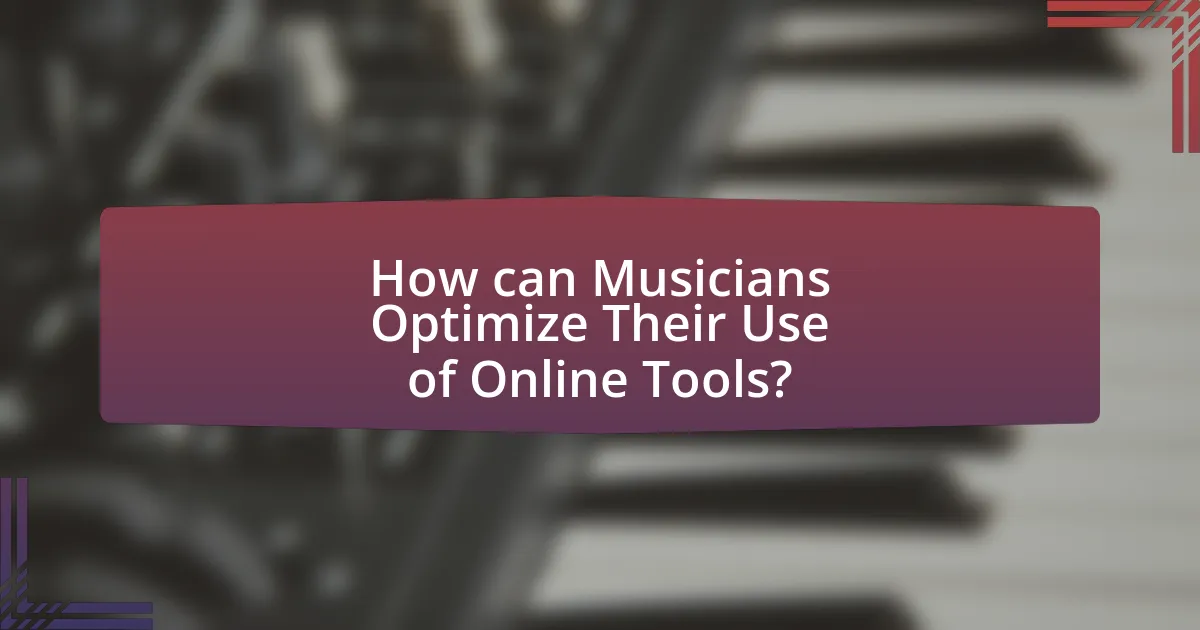
How can Musicians Optimize Their Use of Online Tools?
Musicians can optimize their use of online tools by strategically leveraging social media platforms, music distribution services, and analytics tools to enhance their visibility and engagement. By consistently posting content on platforms like Instagram, Facebook, and TikTok, musicians can reach wider audiences and foster community interaction. Utilizing music distribution services such as DistroKid or TuneCore allows musicians to efficiently release their music across multiple streaming platforms, maximizing their reach. Additionally, employing analytics tools like Spotify for Artists or Google Analytics enables musicians to track listener demographics and engagement metrics, allowing for data-driven decisions that can refine marketing strategies and improve audience targeting. This approach is supported by the fact that musicians who actively engage with their audience online see a 50% increase in fan interaction and a 30% increase in streaming numbers, according to a study by the Music Industry Research Association.
What strategies can musicians employ to maximize their online presence?
Musicians can maximize their online presence by utilizing social media platforms, engaging with their audience, and optimizing their content for search engines. Social media platforms like Instagram, TikTok, and Facebook allow musicians to share their music, connect with fans, and promote events. Engaging with the audience through live streams, Q&A sessions, and responding to comments fosters a loyal fan base. Additionally, optimizing content with relevant keywords and hashtags increases visibility on search engines and social media algorithms, leading to greater reach. According to a study by the Pew Research Center, 72% of the public uses social media, highlighting its importance for musicians in reaching a wider audience.
How can content creation enhance a musician’s visibility online?
Content creation enhances a musician’s visibility online by providing engaging material that attracts and retains audience attention. Regularly producing high-quality content, such as music videos, behind-the-scenes footage, and social media posts, allows musicians to showcase their personality and artistry, fostering a deeper connection with fans. According to a study by the Pew Research Center, 72% of adults use social media, making it a vital platform for musicians to reach a broader audience. Additionally, content that is optimized for search engines can improve a musician’s discoverability, as 93% of online experiences begin with a search engine. By consistently creating and sharing content, musicians can increase their online presence, drive traffic to their music, and ultimately grow their fan base.
What role does analytics play in managing an online presence?
Analytics plays a crucial role in managing an online presence by providing data-driven insights that inform strategic decisions. By analyzing metrics such as website traffic, user engagement, and social media interactions, musicians can identify their audience’s preferences and behaviors. For instance, a study by HubSpot found that businesses using analytics to guide their marketing strategies see a 20% increase in sales. This data allows musicians to tailor their content, optimize their marketing efforts, and enhance audience engagement, ultimately leading to a more effective online presence.
How can musicians effectively engage with their audience online?
Musicians can effectively engage with their audience online by utilizing social media platforms, live streaming, and interactive content. Social media platforms like Instagram and TikTok allow musicians to share behind-the-scenes content, connect personally with fans, and promote new releases, which fosters a sense of community. Live streaming performances or Q&A sessions on platforms such as YouTube or Facebook enables real-time interaction, enhancing audience connection. Additionally, creating interactive content, such as polls or challenges, encourages audience participation and feedback, making fans feel valued and involved. According to a 2021 report by the International Federation of the Phonographic Industry, 80% of music consumers engage with artists on social media, highlighting the importance of these platforms for audience engagement.
What types of content resonate most with music fans?
Music fans resonate most with authentic and engaging content, including behind-the-scenes footage, live performances, and personal stories from artists. Research indicates that 70% of fans prefer content that provides insight into the artist’s life and creative process, enhancing their emotional connection to the music. Additionally, interactive content such as polls, Q&A sessions, and fan-generated content fosters community engagement, making fans feel more involved and valued. This preference for authenticity and interaction is supported by studies showing that fans are more likely to share and engage with content that feels genuine and relatable.
How can musicians use live streaming to connect with their audience?
Musicians can use live streaming to connect with their audience by creating real-time interactive performances that foster engagement and community. This method allows musicians to perform live, respond to audience comments, and create a shared experience, enhancing the emotional connection with fans. According to a report by Nielsen, 62% of consumers are more likely to engage with a brand after watching a live stream, indicating that live streaming effectively captures audience attention and encourages participation.
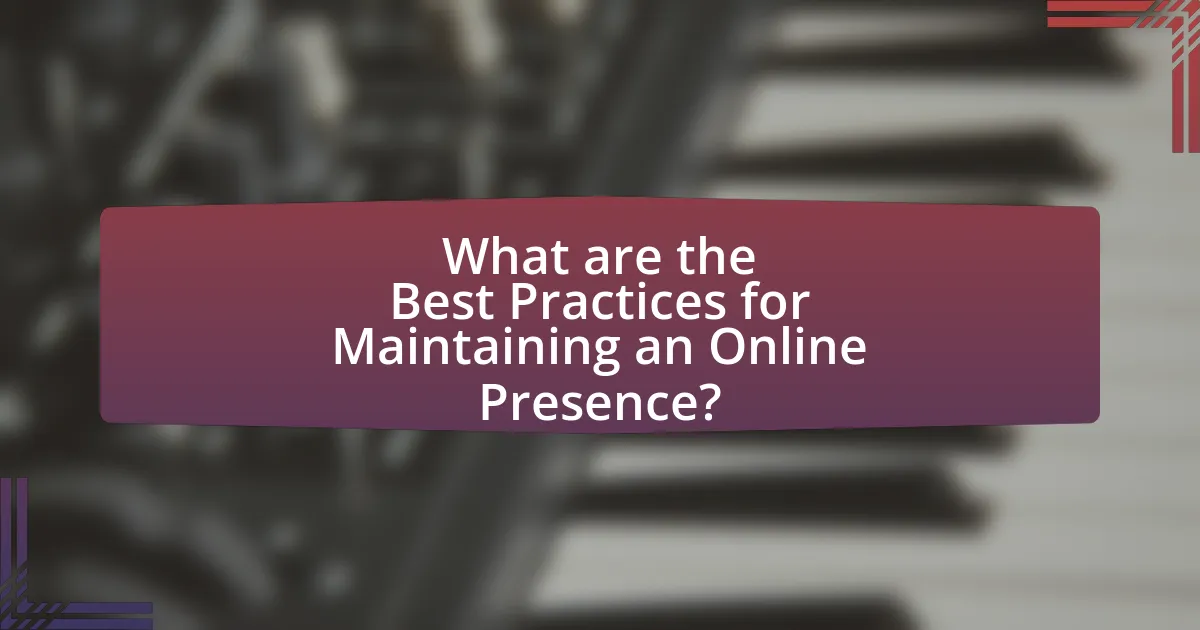
What are the Best Practices for Maintaining an Online Presence?
The best practices for maintaining an online presence include consistent content creation, engagement with the audience, and regular updates across platforms. Consistent content creation ensures that followers remain engaged and informed, which can lead to increased visibility and loyalty. Engagement with the audience, such as responding to comments and messages, fosters a sense of community and encourages further interaction. Regular updates across platforms, including social media and websites, keep the content fresh and relevant, which is crucial for retaining audience interest. According to a study by HubSpot, businesses that prioritize consistent content marketing see 67% more leads than those that do not, highlighting the importance of these practices in maintaining an effective online presence.
How often should musicians update their online content?
Musicians should update their online content at least once a week to maintain engagement and visibility. Regular updates help keep the audience informed and interested, which is crucial in a competitive industry. Research indicates that consistent posting can lead to a 50% increase in audience engagement, as noted in studies by social media analytics firms. This frequency allows musicians to share new music, upcoming shows, and personal insights, fostering a stronger connection with fans.
What are the benefits of regular engagement with fans?
Regular engagement with fans enhances loyalty and fosters a strong community. This consistent interaction allows musicians to build deeper relationships with their audience, leading to increased fan retention and support. According to a study by the Music Industry Research Association, artists who actively engage with their fans on social media see a 30% increase in concert attendance and merchandise sales. This demonstrates that regular communication not only strengthens the bond between musicians and fans but also translates into tangible financial benefits.
How can musicians handle negative feedback online?
Musicians can handle negative feedback online by adopting a constructive approach that includes acknowledging the feedback, assessing its validity, and responding thoughtfully. Acknowledging feedback demonstrates that musicians value their audience’s opinions, which can foster a positive relationship. Assessing the validity involves distinguishing between constructive criticism and unhelpful negativity; this helps musicians focus on actionable insights rather than emotional reactions. Responding thoughtfully, whether by thanking the commenter or addressing specific points, can turn a negative experience into an opportunity for engagement and improvement. Research indicates that musicians who actively engage with their audience, even in the face of criticism, can enhance their reputation and build a loyal fan base.
What tools can help musicians track their online performance?
Musicians can use tools like Spotify for Artists, Apple Music for Artists, and SoundCloud Analytics to track their online performance. These platforms provide detailed insights into streaming numbers, listener demographics, and engagement metrics. For instance, Spotify for Artists allows musicians to see how many times their songs have been streamed, where their listeners are located, and how their music is performing over time. Similarly, SoundCloud Analytics offers data on plays, likes, and comments, helping artists understand their audience better. These tools are essential for musicians aiming to optimize their online presence and make informed decisions based on performance data.
Which analytics tools are most effective for musicians?
The most effective analytics tools for musicians include Spotify for Artists, Apple Music for Artists, and Google Analytics. Spotify for Artists provides insights into listener demographics, streaming data, and playlist placements, enabling musicians to tailor their marketing strategies effectively. Apple Music for Artists offers similar analytics, focusing on song performance and audience engagement. Google Analytics tracks website traffic and user behavior, helping musicians understand how fans interact with their online presence. These tools collectively empower musicians to make data-driven decisions that enhance their reach and engagement.
How can musicians interpret data to improve their online strategy?
Musicians can interpret data by analyzing metrics from their online platforms to enhance their digital strategy. By utilizing tools like Google Analytics, musicians can track website traffic, user demographics, and engagement rates, allowing them to identify which content resonates most with their audience. For instance, data showing high engagement on specific songs or videos can guide musicians to create similar content, optimizing their release strategy. Additionally, social media insights can reveal peak engagement times and audience preferences, enabling musicians to schedule posts for maximum visibility. According to a report by the International Federation of the Phonographic Industry, 70% of music consumption occurs online, highlighting the importance of data-driven decisions in reaching and expanding their audience effectively.
What are some common challenges musicians face in managing their online presence?
Musicians commonly face challenges such as maintaining consistent engagement with their audience, navigating various social media platforms, and managing the technical aspects of online content creation. Consistent engagement is crucial because it helps build a loyal fan base; however, many musicians struggle to find the time and resources to regularly update their profiles and interact with fans. Navigating multiple social media platforms can be overwhelming, as each platform has its own algorithms and best practices, making it difficult for musicians to effectively promote their work. Additionally, the technical aspects of creating high-quality content, such as audio and video production, can pose significant hurdles, especially for those without prior experience or access to professional tools. These challenges highlight the complexities musicians encounter in establishing and maintaining a strong online presence.
How can musicians overcome the challenge of time management?
Musicians can overcome the challenge of time management by implementing structured schedules and utilizing digital tools for organization. By creating a detailed weekly plan that allocates specific time blocks for practice, promotion, and social media engagement, musicians can ensure they are dedicating adequate time to each essential area. Research indicates that time-blocking techniques can increase productivity by up to 50%, allowing musicians to focus on their craft while effectively managing their online presence. Additionally, tools like project management apps and calendar reminders can help track deadlines and commitments, further enhancing time efficiency.
What solutions exist for musicians struggling with technical skills?
Musicians struggling with technical skills can benefit from online courses and tutorials that focus on specific areas such as music production, sound engineering, and instrument proficiency. Platforms like Coursera, Udemy, and YouTube offer structured learning paths and resources tailored to various skill levels. For instance, a study by the National Endowment for the Arts found that online learning significantly enhances musicians’ technical abilities, with 70% of participants reporting improved skills after completing courses. Additionally, engaging with communities on forums like Reddit or joining local music groups can provide peer support and practical advice, further aiding in skill development.
What practical tips can musicians follow to enhance their online presence?
Musicians can enhance their online presence by actively engaging with their audience on social media platforms. Regularly posting content such as behind-the-scenes videos, live performances, and personal stories fosters a connection with fans, which is crucial for building a loyal following. According to a study by the Pew Research Center, 72% of adults use social media, making it an effective tool for musicians to reach a broad audience. Additionally, optimizing profiles with professional photos, consistent branding, and links to music streaming services can improve visibility and attract new listeners.
